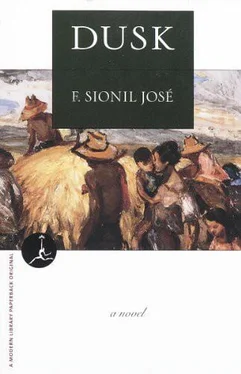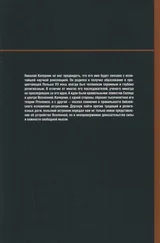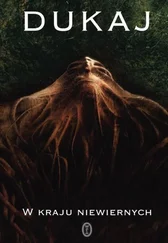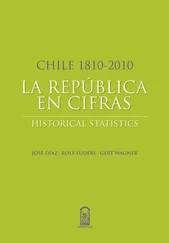Istak took the torch from his mother and went to the cart. In its red glow, he saw what was inside — the sacks at one end, the figure stretched motionless on the bamboo floor — an old man with a pinched face and eyes closed.
“He is asleep,” Istak said, peering briefly at them from the opening of the canopy. In that instant, a gust of wind snuffed out the light. Istak bent low to feel the man’s pulse. In the last few years that he had worked in Cabugaw, Padre Jose had taught him what he knew of sicknesses, how to look at a person and from the feel of his pulse, his warmth, deduce what ails him. Istak’s hand rested on the man’s arm and he found no wrist or hand — just a stump that had grown cold. Like his father, the man did not have a right hand!
I have seen men die as Padre Jose recited the last unction and I stood beside him, holding aloft the cross before the eyes that sometimes could no longer see. I have seen the dead in repose, in wooden coffins, or just wrapped up in old blankets, buri mats, or even bamboo slats from fish traps. I have stared at their sallow faces even as the holy water was splashed on their ashen skins like rain upon stone. I have seen them, but touched them, never.
A chill came over Istak and he pitched out of the cart, the splinter smoking in his hand. “Your husband is dead,” he said.
Dalin sank slowly to the ground. She did not speak. Moans were ripped from her — animal sounds that were not a wail, but the horrible nameless sound of grief.
Before the cocks crowed, the neighbors already knew. An-no had gone to them asking for old bamboo that could be made into a pallet for the corpse.
Dalin had objected. “We can just wrap him in a blanket and let the earth claim him,” she said.
“We have to bury him correctly,” An-no said.
After Dalin had changed the rags of the corpse, they brought it down and laid it on the woven slats which they had tied together to make a coffin. Beside it burned a candle which Istak had given her. Their job done, the men and their women dispersed. Only Dalin stayed near the improvised coffin.
Istak dozed in the house. When he awoke, he peered out the door and saw Dalin sitting alone on the stump. He went down to her.
“It is not for you to keep the wake,” she said. “I have already been a burden to all of you.”
“God sent you here,” Istak said. “We have to accept God’s will.”
“No, not God,” Dalin said. Her voice carried with it a challenge, but Istak did not want to argue with her. Besides — the thought came quickly — she was in mourning and she did not even have a black dress.
“It will soon be light,” Istak said. “How far have you traveled? Where did you come from?” He sat on the fork of the cart behind her.
She bowed and cupped her chin in her hand. “It does not matter anymore where I came from or where I will be going.”
The fine contours of her face, her straight back; she looked at him then and for the second time, their eyes locked.
“I am impolite,” she said. “You have all been helpful, you particularly. You really want to know where we came from?”
Istak nodded.
She turned away and cupped her chin in her palms again. “My parents were traders,” she said. “We had a boat — a fine boat — and we sailed up and down the coast twice a year. When its sails were full, its prow could slice the water with the case of a blade. Then came a storm and one evening, off the coast of Bawang, we were wrecked. Many things happened to me. I clung to the mast for two days. My husband — it was he who rescued me. He was going south to look for land and had found what he wanted there. We were going back to his people so that he could tell them the news — to Lawag. He was old enough to be my father, you know that. But I was grateful and I had nothing to give.”
Istak understood, but was curious just the same about how the old man had lost his hand.
She turned to him abruptly. “You don’t know?” she asked. “Isn’t your father without a hand, too?”
Istak was miserable and he regretted having asked the question at all.
“They called him a thief.” Her voice was almost a whisper. “It is the simplest crime and it could mean anything, from stealing time or a sack of grain for which you have slaved a week. They hung him by the hand. Now, does it really matter where I come from or where I am going?”
What was there to say? Istak closed his eyes and tried to blot out the vision flowing to the narrow pit of his brain — the old man with eyes closed, the stump for a hand.
“But don’t pity me,” she said with that brightness that steered him away from his thoughts. “It is fate. Now I have no more home.”
“Then stay with us,” Istak said. “You are safe here and there is food — not much, but you will not be hungry. And there is always work and we will not bother you with your memories. Let the scabs harden and fall without our prodding.”
“I would rather keep moving,” she said. “Return to my home if there is a boat that will take me back, or to that plain which my husband saw, farther down Pangasinan, up the mountains, and then below—”
“Did you se it?”
She nodded. “I have been there,” she said, and then was silent as if remembering all the bitterness that was banished. She spoke again, this time in quiet joy. “You can smell the land. Its freshness is in the air, in the light — all through the day. You can taste it in the water from the spring, in the flavor of the three-month grain. The plain is all around you, vast as the world, and without hills. It melts, hazy and blue with the sky, as far as you can see. The forest is there, too, alive with wild boar, deer, and pythons as big as coconut trunks, they say, and just as long. But it is a forest that is kind. It belongs to no one and anyone who goes into it soon loses fear of the dark. You become part of the forest, they say, your veins grow out of you like roots seeking the soil. In the forest, you can live even if you do not hunt. A new life awaits you there.”
Istak listened, intoxicated and believing every word. He had heard of the new land, too, not just from the traders who had gone to the coast then backtracked through Pangasinan but from the Igorots whom he had met when he and Padre Jose had gone all the way to Natonin, and there, at the top of the mountain, they had looked down at God’s country.
“If we could only leave,” he said. “Here, we are fortunate if we own a farm as big as the palm of our hands. All the land we till is not ours.”
He stood up and walked to the tamarind stump where she sat. The fireflies that had ignited the dalipawen tree had taken flight and disappeared in the bowels of the night. The air had become crisper and it filled his lungs with sweetness. Soon it would be light. “But what does the future hold for us? We are tied here forever,” he said, rubbing his palms; they had begun to harden. They were soft once, almost like a woman’s, because he had not held a plow for years and what he held were books, pens, and an occasional broom. And Dalin’s hands — were they also as rough as his mother’s? He took her hand. It was rough, as he knew it would be, and she did not draw it away.
“Do not worry,” he told her, freeing her hand. “Although a widow, you are still very young.”
“It was not my wish to be one,” she said. “He knew I cared for him, that I tried to give him back his health. I wanted to make him happy.”
“He is a handsome corpse,” Istak said. “When we bury him in the morning, you will know what I mean. I was a sacristan and a teacher, too.” He wanted to tell her more but he held back. He did not want to sound boastful. “Even if we do not take the body to church for the priest to bless — I know all the prayers. Do you believe that?”
Читать дальше












